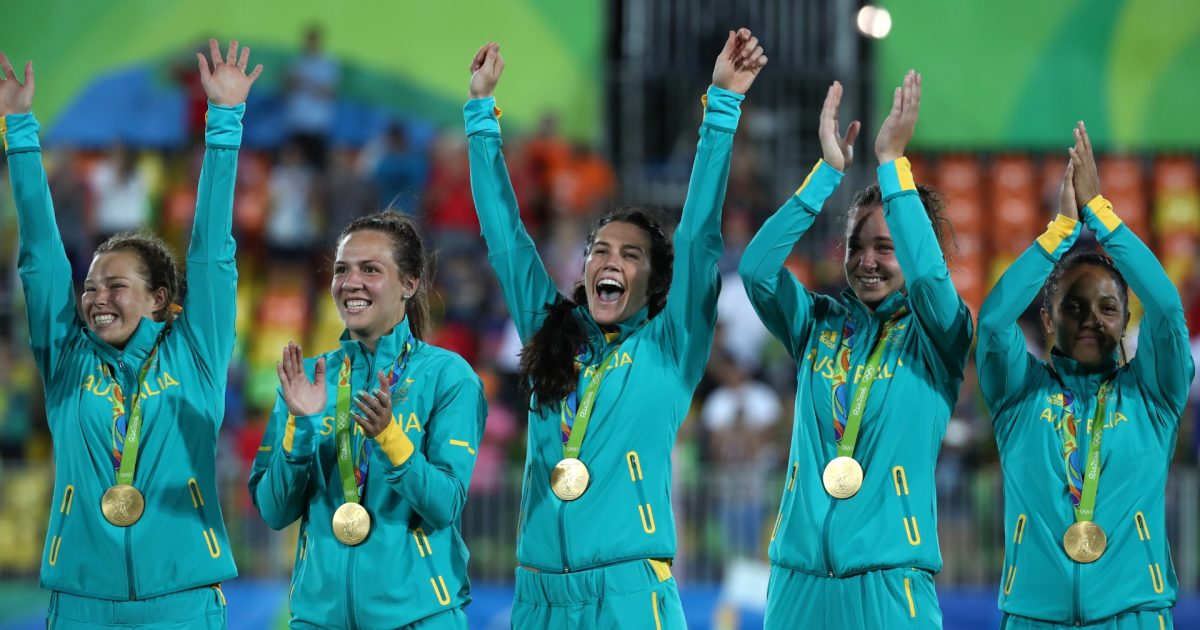'Huge turning point': How Aussie's Olympic triumph inspired future teammate

The Australian Women’s Sevens team inspired a nation with their performance at the 2016 Rio Olympics, as they beat rivals New Zealand 24-17 in a thrilling gold medal playoff.
As the full-time sounded at Deodoro Stadium, the champion began to celebrate their historic feat – they had etched their names into the record books on the world’s biggest sporting stage.
Superstars Charlotte Caslick, Shannon Parry and Sharni Williams had helped forge a legacy which has continued to inspire others.
For Australian sevens ace Isabella ‘Bella’ Nasser, the 2016 Games was a turning point in both her life and career.
Growing up, Nasser played water polo, swimming and touch football – the Olympics was always on her radar. But the success of the sevens team in Rio a “turning point” for the Olympic hopeful.
Nasser developed her game at prestigious Brisbane high school State High, and went on to make her World Series debut in Cape Town this season.
After idolising the champion team from afar, Nasser is now training and playing alongside some of the greatest players in the games history.
“I was about to say I sort of pinch myself half the time,” Nasser told RugbyPass. “I’m playing with the Sharni Williams and the Charlotte Caslick’s. It’s amazing to be part of a profile like this.
“Maybe a year ago or two years ago, I was doing a few camps here… I wasn’t fully contracted.
“I was like, ‘Oh my gosh, these are the most athletic, amazing girls both on and off the field.’
“I was definitely intimidated and definitely thought there were amazing, which they are.
“To be part of them now and to see them every single day, train with them every single day, is pretty unreal.”
Late last year, Australian star Charlotte Caslick added another prestigious individual accolade to her unrivalled sevens CV.
After leading the team to successful on the World Series, at the Commonwealth Games and at the Sevens World Cup, Caslick was named World Rugby’s Women’s Sevens player of the year
To put it simply, Caslick is one of the greatest rugby players that sevens has ever seen.
“I feel like she’s a role model to so many people, so many young girls, even now,” she added.
“She went through a similar path as me, she went through the State High and Queensland stuff, she’s probably the first person to go through it.
“Definitely a role model and definitely someone I still look up to.
“Charlotte went to State High and she played touch as a young girl so I was a bit like, ‘Maybe I could do that.’
“Especially after the 2016 Rio Olympics it was like the next big thing.”
Nasser has been named in the Australian Women’s squad for the Hong Kong Sevens. For the first time ever, the Women’s World Series will make a stop at the traditional home of the sport.
New Zealand have dominated their year’s World Series so far, but Australia are eager to bounce back at Hong Kong Stadium.
“New Zealand have been so strong and we have to respect that but we’ve been working really hard to sharpen our axe and hopefully put on good show in Hong Kong.
“It’d be pretty unreal to come away with the gold in Hong Kong so that’s the goal.
“In front of all those people and at such a big competition as well, it’d be unreal to get the job done.”

































